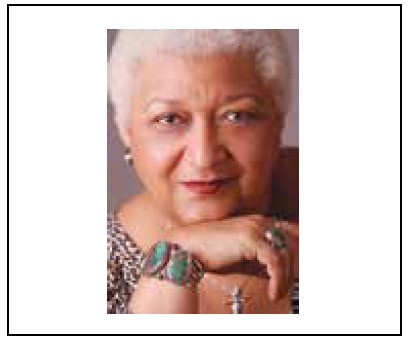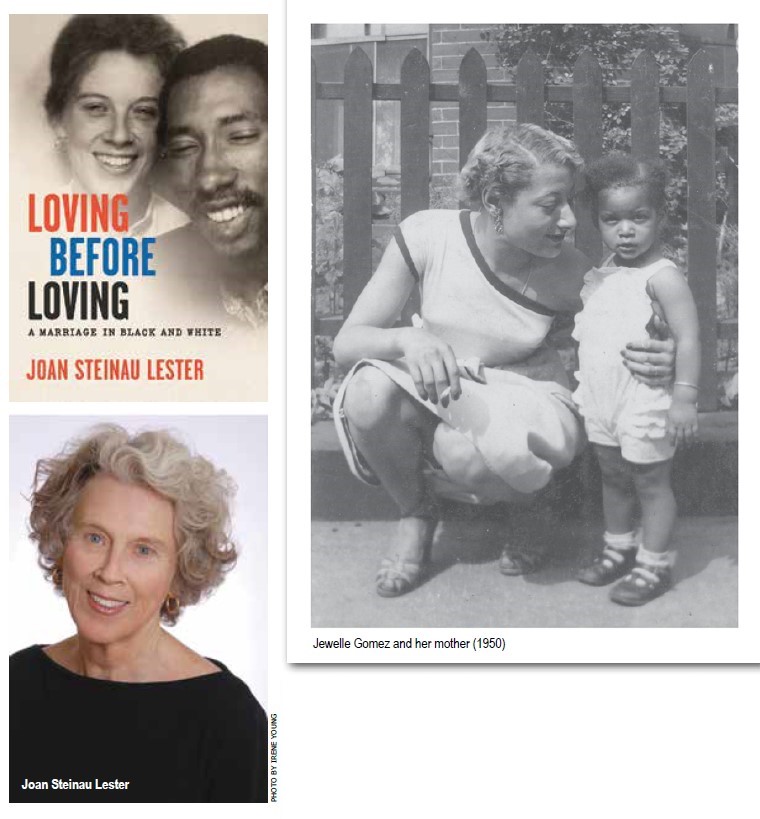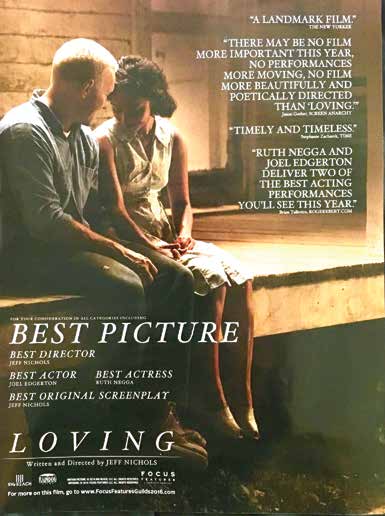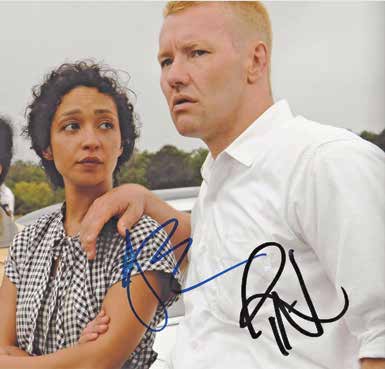
By Jewelle Gomez–
I’ve got a film to talk about that then brings me to a book. I’m on a cultural roll right now. And not just because we’ve been in pandemic lockdown. But color is on every reflective person’s mind now and almost always on mine.
Loving was released in 2016; since everything is streaming, I watched it again recently. It stars Ruth Negga and Joel Edgerton as the real-life couple Mildred and Richard Loving. He was white, she was Black and Native American, and they grew up as neighbors in a small, rural town.

Violating the “miscegenation” laws of Virginia (and many other states), they married in 1958 and were sentenced to a year in jail. Their lawsuit precipitated the landmark Supreme Court case (Loving v Virginia, 1967) that toppled the laws against interracial marriage in 16 states. Their victory is celebrated every year on Loving Day, June 12th. Mildred Loving later voiced her support for marriage equality, insisting that race and gender had no place in marriage law.
The film touched me politically and personally because of my own mother’s experiences in a small Rhode Island town only a couple years later. When my mother (fair-skinned, mixed race) married my stepfather (white), they were settled happily in a former mill town. That is until I came to visit. Her neighbors got a look at me and my grandmother and realized my mother was not white. The neighbors in Virginia who’d known the Lovings all of their lives were supportive; it was the police who persecuted them.

In my mother’s case, it was the neighbors who broke her windows, made threatening phone calls, and set fire to trash in her tiny front yard. The police took none of the neighbors’ terrorism seriously. The chilling situation was resolved when urban renewal split the neighborhood with a highway. It displaced everyone, sending the bigots off to scare somebody else. My mother and her husband, however, never let down their guard. They devised tricks and codes to ensure my mother’s safety when she was home alone. For decades, their anxiety was always lurking not far in the background.
The Loving story captures that same personal trauma and is full of the terror and frustration the young couple experienced. Both Negga and Edgerton have a very sensual screen presence, so you want them to be together. At the same time, you worry for their safety every second—just as I did for my mother; just as I do today when I see a young Black kid alone on the street.

If we want to start to understand the insidious nature of white fear in this country and the destruction it causes, this is a film not to be missed. When asked by their lawyer if he had a message to send to the Supreme Court, Justice Richard Loving said simply: “Tell them I love my wife.” Fortunately, it was not the Trump dominated Court that sits today.
A new book that amplifies this story is Loving Before Loving, a literary memoir by Bay Area novelist/essayist Joan Steinau Lester, a longtime friend. Over the years, Joan and I have shared our writing, the crazy edits we have to make, and the pitted road to publication. In her memoir, Joan recounts her early days as a white ally in the Civil Rights movement, her arduous path to her literary career in a time when a woman’s role in publishing was often just to type and get the coffee.
It’s a path that has a direct trajectory through her 1962 marriage to noted Black SNCC activist and writer Julius Lester. With the Loving decision still in the future, interracial marriage was illegal in 27 states. Partnering with a male writer has a complexity for a woman writer that Joan sensitively unravels. She navigates the issues of race and gender in her book as openly as she does in her equity activism.
She explores the obstacles to such a union even in New England and New York; even between two thoughtful, “woke” people. Steinau Lester shares an intimate portrait of her youthful innocence and how her activism in the women’s movement helped her find her voice and her sexuality.
Even with decades and geography between the landmark Loving v Virginia case and Joan’s experiences in the North, she lets the reader inside the emotional rollercoaster one has to travel to dislodge the roots of racism as well as to gain understanding over one’s own body and desire. Her book is a good sendoff for our own journeys toward self-knowledge and forgiveness.
I’ll be in virtual conversation with Joan Steinau Lester this month celebrating her new book: http://www.joanlester.com/index.htm
Jewelle Gomez is a lesbian/feminist activist, novelist, poet, and playwright. She’s written for “The Advocate,” “Ms. Magazine,” “Black Scholar,” “The San Francisco Chronicle,” “The New York Times,” and “The Village Voice.” Follow her on Instagram and Twitter @VampyreVamp
Published on May 20, 2021
Recent Comments